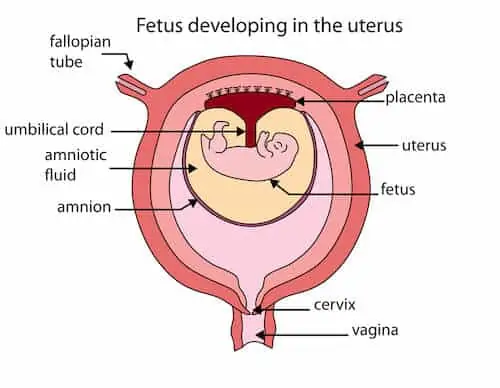When a baby’s spit-up is mucousy, it could signify amniotic fluid in the baby’s stomach after birth. This article is for you if the baby keeps spitting up amniotic fluid!
Quite honestly, I never really thought about amniotic fluid, even while pregnant.
Until I had my youngest.
The doctor told me my amniotic fluid levels were low. I needed to drink more water, I was admonished. But my blood pressure was high, too, due to the food my mother-in-law had been serving me. My doctor didn’t mince any words when conveying to my husband that I needed less salt and more water.
She turned out fine. Both my daughters did.
But recently, I had some messages about amniotic fluid at birth. Well, when I don’t know something, I dig deep to research it. This way, I can make sure I help you find the answers you need to either ease your worries or so you can get the help you need to get things back on track.
Before I do, though, please know the complications involving amniotic fluid are pretty rare, so keep calm and mom on!
If the baby is throwing clear fluid, here is what you need to know.
What happens when a newborn swallows amniotic fluid?
As you’ve likely gleaned from reading anything about babies in the womb, the amniotic fluid has a critical duty to fulfill. It provides cushioning, which I discussed in recent posts about what happens if you bump your bump.
It also helps the muscles and skeletal aspects develop. Swallowed in the womb, this amniotic fluid helps the gastrointestinal tract develop. When you are in labor, chemicals are released from your baby’s body. This helps their lungs push out any fluids there.
The pressure from going through the birth canal helps to release it too. I know what you’re thinking, though…what about c-section babies? Since they don’t get pushed through the birth canal, they have a greater chance of TTN or transient tachypnea in newborns.
It clears up on its own in the hospital and has no lasting effects. However, this is usually done when the nurse checks out your c-section baby.
The nurse will suction the mouth, nose, and throat, sometimes needing to go deeper into the windpipe to help clear the way. This action should usually prevent TTN from happening.
Additionally, your baby will cough a little, and as air fills her lungs, any lingering amniotic fluid should be gone.
How long do newborns spit up with that amniotic fluid?
In most cases, this amniotic fluid will clear up somewhere between a few hours post-birth or in about 2 to 3 days. You may hear gagging or gurgling from your new baby, which is freaky. It’s just that excess fluid in their lungs.
While in the hospital, your baby will be monitored for any troubles with this. Additionally, you can rest a bit easier knowing too late in your pregnancy and right before birth, fluid starts moving out of the baby’s lungs in preparation for the air that will soon come when they take their first breaths outside the womb.
With some babies, though, that fluid may stick around. And as it does, babies will cough to clear it away. This results in the baby’s mucousy spit-up, and you may hear gagging and gurgling. Again, this is all more common for preemies and c-section babies, though it should be less of an issue with the nurses there suctioning things out.
What does amniotic fluid spit up look like?
Amniotic fluid spit-up will look a lot like mucous. Because, well, it contains mucous. So you’ll see a slightly thick-ish goop that can make them gag when it hits the back of the throat. They may start choking, and that, of course, will freak you out. Rightfully so!

But if you sit your baby upright or put her over your shoulder, she’ll either swallow it or spit it out and be fine.
Can a baby choke on amniotic fluid?
Yes, babies can choke on amniotic fluid, but they’re generally well-equipped to cough it up and spit it out. With a bit of uprighting from you, they should clear it just fine.
Relevant: What you can do when the baby is choking from mucus.
Sometimes, a baby can inhale that amniotic fluid during birth in those rare circumstances. When a baby (or anyone) inhales something into the lungs, the medical term is an aspiration.
I say this is rare because you will still be in the hospital during all this. You and your baby will be monitored, and should anything as this happens, the doctors and nurses will be all right on top of it. If your baby has inhaled amniotic fluid, they will detect and treat the problem, and everything will be ok.
In severe instances, it can develop into amniotic fluid aspiration pneumonia. They are also called amniotic fluid aspiration by meconium aspiration. Remember, meconium is the first poop baby makes right after birth, but sometimes, they may poop right before being born.
Again, not all that common, but it does happen. And what makes it even stranger is that the meconium in this situation gets into that amniotic fluid. Then if your baby were to aspirate on that fluid with the meconium, that can get into the lungs and cause significant trouble.
But! There’s a big, big but here.
You should try not to worry because those trained medical folks taking care of you will be checking the amniotic fluid at birth for the presence of that first poop. If they find it, they will run additional tests and stop any problems before starting.

So, please, Mama, try not to worry too much. This is extremely rare, even if you have a c-section or premature birth.
If the baby is spitting up curdled milk, here is how to deal with that.
What should I do if my baby spits up amniotic fluid?
Now that you’re less worried, what do you do if your baby spits up that mucous stuff? If you hear gagging and gurgling, place your baby on her side and pat her back like you would for burping. You can also upright her and help her spit it up.
Additionally, a bulb syringe can help get the fluid out of the back of the nose and throat.
Again, this is usually well taken care of before being discharged from the hospital.
But, if you are worried it isn’t just gagging (like in the case of choking or having trouble breathing), this is when you should whisk your newborn back to the ER:
- Skin is blueish
- Baby is struggling to breathe or stops breathing
- Baby can’t cry or make sounds
- Baby falls unconscious
- You notice that when inhaling, your baby’s ribs and chest pull inward
- You hear a soft or high-pitched sound when the baby inhales each time
- Coughing is weak and not effective
Are you still worried? Then on your next checkup, talk to your doctor about this. Ask them what they do when it happens, and I promise your mind will feel light and relieved again.
Leslie Berry lives with her husband and two young daughters in Los Altos, California, where she loves helping other moms get comfortable with motherhood and embracing the insanity with facts peppered with laughs.
She loves eating too much sushi, exercising, and jamming out on her Fender. Read more about Leslie here.






